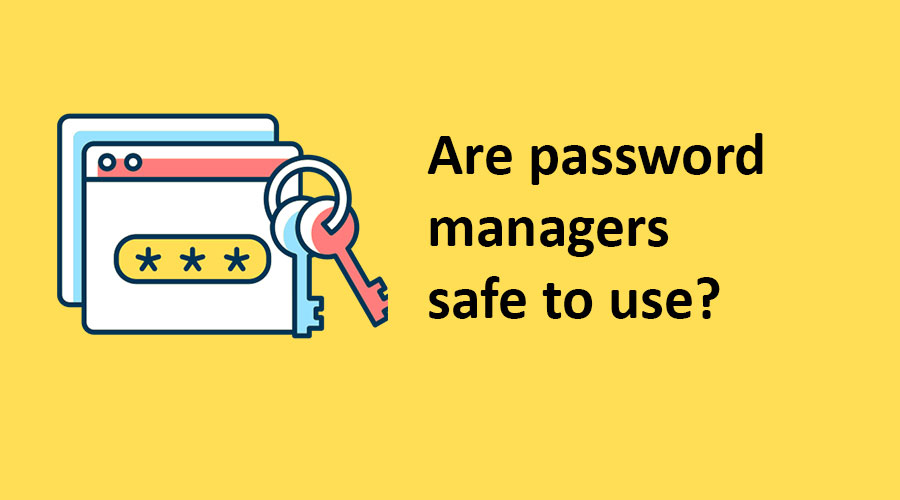
Yes, password managers can be a safe and secure solution for managing your passwords. Here are some key points to consider:
-
Encryption: Password managers use strong encryption algorithms to encrypt and store your passwords. This means that even if the password manager's data is compromised, the encrypted passwords are extremely difficult to decrypt without the master password.
-
Master password: When using a password manager, you only need to remember one strong master password that grants you access to all your stored passwords. It's important to choose a unique and strong master password and avoid using easily guessable information.
-
Two-factor authentication (2FA): Many password managers offer the option to enable 2FA, which adds an additional layer of security. With 2FA, you need a second form of verification, such as a code sent to your mobile device, to access your password manager account.
-
Secure password generation: Password managers often have built-in password generators that can create strong, random, and unique passwords for each of your accounts. This helps you avoid using weak or easily guessable passwords.
-
Autofill and protection against phishing: Password managers can automatically fill in your login credentials for websites and apps, which helps prevent you from falling victim to phishing attacks that attempt to steal your passwords by tricking you into entering them on fake websites.
-
Cross-platform synchronization: Password managers often provide synchronization across multiple devices, ensuring that your passwords are securely accessible and up to date on all your devices.
-
Regular updates and security audits: Reputable password manager providers regularly update their software to address vulnerabilities and security issues. They also undergo security audits to ensure the robustness of their systems.
How to enchance your pribacy and security?
However, it's important to note that no security solution is entirely foolproof. While password managers can greatly enhance your security, they are not immune to potential risks. Here are some additional considerations:
-
Master password security: Ensure that you choose a strong and unique master password for your password manager account. Avoid using easily guessable information or reusing passwords.
-
Trustworthy provider: Choose a reputable password manager from a trusted provider. Do some research, read reviews, and opt for password managers that have a good track record in terms of security and privacy.
-
Software updates: Keep your password manager software up to date with the latest versions to benefit from the latest security patches and improvements.
-
Device security: Ensure that the devices you use to access your password manager are also adequately protected with strong passwords, screen locks, and updated security software.
By following these guidelines and practicing good security hygiene, password managers can be a valuable tool in managing and securing your passwords effectively.
What are the risks of using a password manager?
While password managers offer significant benefits in terms of password security and convenience, there are also potential risks to consider:
-
Master password compromise: The master password that grants access to all your stored passwords is crucial. If an attacker gains access to your master password, they could potentially access all your stored passwords. It is important to choose a strong and unique master password and ensure it is well protected.
-
Software vulnerabilities: Like any software, password managers can have vulnerabilities that hackers may exploit. However, reputable password manager providers typically release regular updates to address security issues. It's important to keep your password manager software up to date to benefit from the latest security patches.
-
Malware and keyloggers: If your device is infected with malware or keyloggers, they may be able to capture your master password or intercept your password manager's data. To mitigate this risk, it is essential to maintain strong security measures on your devices, such as using reputable antivirus and anti-malware software.
-
Cloud storage vulnerabilities: Password managers often offer cloud synchronization, which allows your passwords to be securely stored and synced across devices. However, the cloud storage infrastructure can still be vulnerable to attacks or data breaches. It is important to choose a password manager with robust security measures and encryption for data stored in the cloud.
-
Dependency on a single provider: By using a password manager, you become reliant on a single provider for the security and availability of your passwords. If the provider experiences a breach or goes out of business, it could have implications for accessing or recovering your passwords. Regularly backing up your password manager data and choosing a reputable provider can help mitigate this risk.
-
Human error and forgetfulness: If you forget or lose your master password or encounter issues with account recovery options, you may face difficulties accessing your stored passwords. It is important to have a backup plan and follow the password manager provider's recommended procedures for account recovery.
-
Social engineering attacks: Hackers may attempt to deceive you into revealing your master password or other sensitive information through social engineering techniques. It is important to be cautious of phishing attempts and always verify the authenticity of any requests for your password or personal information.
While these risks exist, it is important to note that reputable password managers invest in strong security measures and encryption protocols to protect your passwords. For most users, the benefits of using a password manager generally outweigh the potential risks, as long as best practices for security and responsible password management are followed.
Which password manager type is the most secure?
There are different types of password managers available, each with its own security considerations. Here are three common types:
-
Local Password Managers: Local password managers store your passwords locally on your device, such as a computer or a mobile device. They typically encrypt your passwords with a master password that you create. The encrypted password database remains on your device and is not transmitted over the internet. Local password managers offer the advantage of keeping your passwords entirely under your control and offline, reducing the risk of cloud-based attacks or data breaches. However, they may lack features like cross-device synchronization and backup options.
-
Cloud-Based Password Managers: Cloud-based password managers store your encrypted password database on secure servers in the cloud. They offer the convenience of accessing your passwords across multiple devices and automatic synchronization. With cloud-based password managers, the encrypted passwords are transmitted over the internet between your devices and the cloud storage. The security of cloud-based password managers relies on strong encryption, server-side security measures, and the trustworthiness of the provider.
-
Hybrid Password Managers: Hybrid password managers combine the features of local and cloud-based password managers. They allow you to store your encrypted password database locally on your device, while also offering the option to synchronize and backup your passwords in the cloud. This provides the benefits of both local storage and cloud-based convenience.
In terms of security, the most important factors to consider are:
- Encryption: Look for password managers that use strong encryption algorithms to encrypt your passwords, such as AES-256 encryption.
- Zero-knowledge or end-to-end encryption: Zero-knowledge or end-to-end encryption means that only you have access to your passwords, and the provider cannot access or decrypt them. This ensures that even if the provider's servers are compromised, your passwords remain secure.
- Two-factor authentication (2FA): Password managers that offer 2FA add an extra layer of security by requiring a second form of verification, such as a code sent to your mobile device, to access your password manager account.
- Reputation and security track record: Choose a reputable password manager provider with a strong security track record and positive reviews.
Ultimately, the most secure password manager type depends on your specific needs and preferences. Local password managers provide offline control, while cloud-based password managers offer cross-device synchronization. Hybrid password managers offer a balance between the two. Assess the security features and evaluate the reputation and trustworthiness of the provider before choosing a password manager that best suits your requirements.
What to do if your password manager gets hacked?
If a password manager gets hacked, it can potentially expose your stored passwords and other sensitive information to the attackers. This situation can have serious consequences, as it may lead to unauthorized access to your online accounts and compromised personal data. In the event that your password manager is hacked, here are some steps you can take:
-
-
Change Your Master Password: Start by changing the master password of your password manager. This step will ensure that the attacker can no longer access your encrypted data. Choose a strong, unique password that hasn't been used elsewhere.
-
Enable Two-Factor Authentication (2FA): If your password manager supports two-factor authentication, enable it immediately. This adds an extra layer of security by requiring a second verification step, such as a unique code sent to your mobile device, in addition to your master password. It helps prevent unauthorized access even if the attacker has your master password.
-
Assess the Damage: Determine which accounts and information might be compromised. Review the list of accounts stored in your password manager and identify any critical or high-value accounts, such as email, banking, or social media. Make a note of these accounts for further action.
-
Change Passwords for High-Value Accounts: Visit the websites or applications associated with the high-value accounts and change their passwords immediately. Create strong, unique passwords for each account, and avoid reusing passwords across different platforms. If possible, enable two-factor authentication for these accounts as well.
-
Notify Service Providers: If the password manager breach has the potential to impact your accounts with specific service providers, it's essential to notify them about the situation. Contact their customer support or security teams to inform them of the potential compromise and follow their recommended steps for account recovery or additional security measures.
-
Monitor Account Activity: Keep a close eye on your accounts for any suspicious activity or unauthorized access. Regularly review transaction histories, account settings, and any notifications or emails related to your accounts. If you notice any unusual activity, report it to the respective service provider immediately.
-
Consider a Password Manager Transition: Depending on the severity of the breach and your level of trust in the affected password manager, you may want to consider transitioning to a different password manager. Research reputable alternatives with strong security features and consider migrating your passwords and accounts to the new platform.
-
Stay Informed and Vigilant: Stay updated on the latest developments regarding the password manager breach. Follow any announcements or instructions from the password manager provider regarding the incident. Stay vigilant against phishing attempts and scams, as attackers may try to exploit the situation to trick you into revealing sensitive information.
-
While password managers offer convenience and enhanced security, it's important to implement additional security measures and maintain best practices to protect your digital identity.




